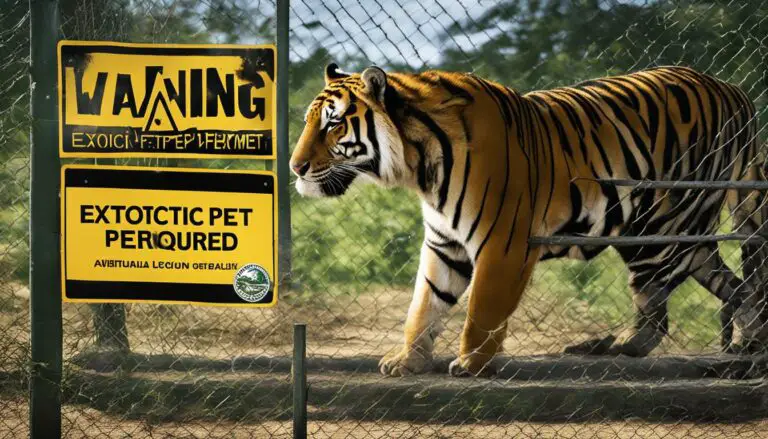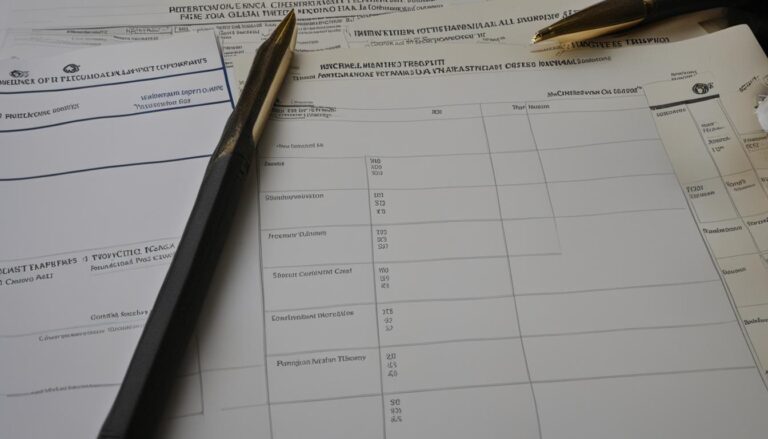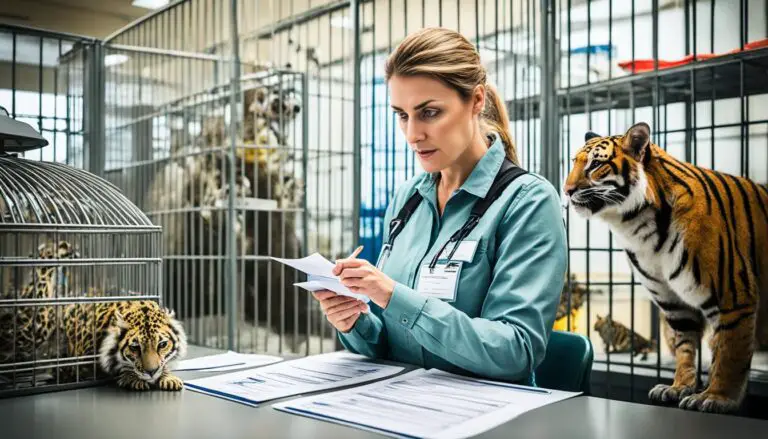Exotic Pet Ownership: Is it Legal in Your State? Know the Law
Owning an exotic pet can be a thrilling and rewarding experience.
These animals are unique and fascinating, often providing a sense of wonder and awe.
However, it’s important to remember that exotic pets are not like typical domestic pets, and they require specialized care, attention, and understanding to thrive.
Before bringing an exotic pet home, it’s crucial to understand the legal regulations surrounding them.
Key takeaways:
- Exotic pet ownership is a unique and appealing experience, but it comes with legal implications that vary from state to state.
- The United States has federal and state regulations in place to govern the ownership of exotic pets.
- Understanding the legal requirements for exotic pet ownership in your state is important before considering getting one.
- Different species of exotic pets may have specific regulations and requirements.
- Obtaining permits and licenses is often necessary for owning exotic pets, and it’s important to know the agencies and contacts in your state for this process.
Private Exotic Pet Ownership Laws in Each State
Here’s a list of the specific laws that prohibit, only partially prohibit, call for licensing or offer other restrictions on the private ownership of wild or exotic animals in all 50 states:
States without a ban:
- Alabama
- Nevada
- North Carolina
States that require a license:
- Arizona
- Idaho
- Indiana
- Maine
- Mississippi
- Montana
- North Dakota
- Oklahoma
- Pennsylvania
- South Dakota
- Texas
- Wisconsin
States with a partial ban:
- Alaska
- Arkansas
- Connecticut
- Florida
- Kansas
- Louisiana
- Michigan
- Minnesota
- Nebraska
- Tennessee
- Virginia
- West Virginia
- Wyoming
States with an extensive ban:
- California
- Colorado
- Georgia
- Hawaii
- Illinois
- Iowa
- Kentucky
- Maryland
- Massachusetts
- New Hampshire
- New Mexico
- New York
- Oregon
- South Carolina
- Utah
- Vermont
- Washington
The Unique Appeal of Exotic Pets
Exotic pets are different from traditional pets, and their unique qualities are what make them appealing to many owners.
These animals are often exotic, rare, and beautiful, which makes them a unique addition to any household.
Additionally, owning an exotic pet can be a conversation starter and can be a way to bond with other people who share the same interests.
The Legal Implications of Exotic Pet Ownership
Owning an exotic pet can also have legal implications.
Regulations surrounding exotic pet ownership vary widely from state to state, and even within cities or counties.
It’s crucial to understand the specific regulations in your area before bringing an exotic pet home.
This can help ensure that you are complying with all necessary regulations, and that you are not putting yourself or your pet at risk.
Understanding the Legal Requirements for Exotic Pet Ownership in Your State
In order to understand the legal requirements for owning an exotic pet in your state, it’s important to do your research.
You can start by looking up the specific regulations and laws in your state, which will provide you with a basic understanding of what is required.
Additionally, you may want to contact local agencies or organizations that specialize in exotic pet ownership, which can provide you with more detailed information.
Exotic Pet Laws in the United States
There are certain acts and federal regulations that you need to keep in mind, such as:
The Lacey Act and Federal Regulations
One of the primary federal regulations regarding exotic pet ownership is the Lacey Act.
This act makes it illegal to transport, sell, or possess certain species of animals that have been deemed injurious to the environment or human health.
This includes many types of snakes, reptiles, and non-native mammals, among others.
State Regulations and Differences in Exotic Pet Laws
In addition to federal regulations, many states have their own laws and regulations surrounding exotic pet ownership.
Some states may have a comprehensive ban on certain types of animals, while others may require permits, licenses, or other documentation in order to legally own an exotic pet.
Animal Welfare Act and Exotic Pet Ownership
The Animal Welfare Act is another federal regulation that applies to exotic pet ownership.
This act outlines minimum standards for the care and treatment of animals, including exotic pets.
Additionally, it requires that certain facilities that exhibit or sell animals, including pet stores and breeders, be licensed and inspected.
Exotic Pet Regulations in Your State
Exotic pet ownership is regulated differently from state to state in the United States.
Therefore, it’s essential to understand the specific laws and regulations that govern exotic pet ownership in your state.
These laws can vary from state to state, and they outline the specific requirements for owning an exotic pet.
- Some states (e.g. Alabama) have very lax laws and regulations regarding owning exotic pets.
- While others (e.g. Kansas) have strict regulations that require owners to obtain permits or licenses to own an exotic animal.
- Some states (e.g. California) have even gone so far as to ban the ownership of certain types of exotic animals altogether.
To determine the regulations in your state, you can contact your state wildlife agency or Department of natural resources.
They can provide you with information on the types of exotic animals that are legal to own in your state, as well as the requirements for obtaining permits and licenses.
It’s important to note that even if your state doesn’t have strict regulations on exotic pet ownership, it’s still your responsibility to provide proper care and housing for your pet.
This includes providing a suitable environment, proper nutrition, and adequate medical care.
Overview of Exotic Pet Laws in the United States
In order to fully understand the regulations surrounding exotic pet ownership, it’s important to have an overview of the laws in the United States.
This can help you to understand the scope of the issue and can help you to identify any gaps in your knowledge.
Laws and Regulations Governing Exotic Pet Ownership in Your State
Once you have an overview of the laws in the United States, you can then start to research the specific laws and regulations in your state.
This can help you to identify any specific requirements or restrictions that you may need to comply with.
Legal Requirements for Obtaining Exotic Pets in Your State
In addition to understanding the regulations surrounding exotic pet ownership, it’s also important to understand the legal requirements for obtaining an exotic pet in your state.
This can include obtaining permits or licenses, as well as complying with any other requirements that may be in place.
Legal Requirements for Obtaining Exotic Pets in Your State
If you have decided that owning an exotic pet is for you, it is important to know the legal requirements for obtaining one in your state.
These requirements vary widely, so it is important to do your research and make sure you are following the laws in your area.
Here are some factors to consider:
1. Prohibited Species
Some states prohibit ownership of certain species altogether.
For example, in California, it is illegal to own ferrets, whereas in Texas, they are legal.
Similarly, in Hawaii, owning any type of snake is prohibited.
2. Permits and Licenses
Many states require permits or licenses for owning exotic pets.
These permits usually involve a fee, and may require proof of proper housing and care for the animal.
It is important to note that even if a species is legal to own in your state, you may still need a permit to keep it legally.
3. Inspection Requirements
Some states require inspections of the animal’s living conditions, such as enclosures and food storage, in order to ensure proper care.
Failure to pass an inspection can result in the revocation of your permit or license.
4. Age and Background Checks
Some states require potential exotic pet owners to meet certain age or background check requirements before obtaining a permit.
For example, in Florida, potential owners must be at least 18 years old, and have no record of animal abuse or neglect.
5. Exotic Pet Veterinarians
It is important to find a veterinarian who specializes in exotic pets in your area, as not all vets are equipped to handle the unique needs of these animals. Your state’s exotic pet regulations may require that you provide proof of a relationship with an exotic pet veterinarian before obtaining a permit.
Exotic Pets: Species-Specific Regulations
In addition to the general legal requirements for owning an exotic pet, there may be species-specific regulations that you need to be aware of. Here are some examples:
Special Regulations for Big Cats
Many states have specific regulations for owning big cats, such as lions and tigers.
These regulations often require extensive fencing and other safety measures, as well as permits and inspections.
Regulations on Reptile Ownership
Some states have specific regulations on the ownership of reptiles, such as snakes and lizards.
These regulations may require permits and inspections, and may also limit the types of reptiles that can be owned.
Regulations for Primate Pet Ownership
Primates, such as monkeys and apes, are often subject to strict regulations, as they can pose a significant danger to humans.
Many states require special permits and inspections for primate ownership, and some prohibit it altogether.
Regulations for Owning Birds of Prey
Owning birds of prey, such as eagles and hawks, is regulated by the federal government.
A permit is required from the U.S. Fish and Wildlife Service, and there are strict requirements for housing and care.
Regulations for Venomous and Dangerous Animals
Many states have specific regulations on the ownership of venomous and dangerous animals, such as venomous snakes and large constrictors.
These regulations may require permits, inspections, and specific safety measures.
Permits and Licenses for Exotic Pet Ownership
If you are considering owning an exotic pet, it is important to understand the permitting process in your state.
Here are some things to keep in mind:
1. Overview of Permit and Licensing Requirements
To legally own an exotic pet, you will need to obtain the appropriate permits and licenses from the state agency that regulates exotic pet ownership.
The permit and licensing requirements for exotic pet ownership typically include:
- Age: You must be at least 18 years old to own an exotic pet.
- Background Check: Many states require a background check before issuing a permit or license for exotic pet ownership.
- Financial Requirements: Some states may require proof of financial ability to care for the animal, including proof of liability insurance or a bond.
- Housing Requirements: Most states require that you provide adequate and appropriate housing for the animal.
- Veterinarian Care: Many states require that exotic pets receive regular veterinary care.
2. Types of Permits for Exotic Pet Ownership
The types of permits required for exotic pet ownership vary by state and species.
Some common types of permits for exotic pet ownership include:
- Possession Permit: This permit allows you to possess the exotic pet in your state.
- Breeding Permit: This permit allows you to breed the exotic pet in your state.
- Exhibition Permit: This permit allows you to exhibit the exotic pet in public.
3. Permitting Agencies and Contacts in Your State
To obtain a permit or license for exotic pet ownership, you will need to contact the appropriate state agency that regulates exotic pet ownership.
The agency will provide you with the necessary application forms, permit fees, and instructions for obtaining the required permits.
Exotic Pet Ownership: Risks and Responsibilities
While owning an exotic pet can be a rewarding experience, it also comes with risks and responsibilities.
Risks Involved in Owning Exotic Pets
Owning an exotic pet can pose significant risks to both the owner and the public.
Some risks of owning an exotic pet include:
- Physical Injury: Many exotic pets can be dangerous and may cause physical injury to their owners or others.
- Health Risks: Some exotic pets can carry diseases that can be transmitted to humans.
- Property Damage: Many exotic pets can cause significant property damage.
- Legal Issues: Violations of exotic pet ownership laws can result in fines, seizure of the animal, or criminal charges.
Responsibilities of Exotic Pet Ownership
Owning an exotic pet also comes with significant responsibilities.
Some responsibilities of exotic pet ownership include:
- Proper Care: Exotic pets require specialized care, and owners must provide appropriate housing, nutrition, and veterinary care.
- Public Safety: Exotic pet owners are responsible for ensuring the safety of the public, particularly in situations where the animal may pose a danger.
- Legal Compliance: Exotic pet owners must comply with all laws and regulations governing exotic pet ownership.
- Ethical Considerations: Owners must consider the ethical implications of owning an exotic pet and the impact on the animal’s welfare.
The Costs of Owning an Exotic Pet
Owning an exotic pet can also be expensive.
The costs of owning an exotic pet may include:
- Purchase Price: Exotic pets can be expensive to purchase, with some species costing thousands of dollars.
- Housing and Equipment: Exotic pets require specialized housing and equipment, which can be costly.
- Veterinary Care: Many exotic pets require specialized veterinary care, which can be expensive.
- Food and Supplies: Exotic pets require specialized diets and supplies, which can be costly.
Safety Precautions for Exotic Pet Owners
When it comes to owning an exotic pet, safety should be a top priority.
Many exotic pets can pose a danger to their owners and the people around them if not properly cared for and handled.
Here are some safety precautions that exotic pet owners should take:
- Proper Enclosures – One of the most important safety precautions for exotic pet owners is to ensure that their pet has an appropriate and secure enclosure. The enclosure should be large enough for the pet to move around comfortably and have access to food, water, and shelter.
- Handling – Exotic pets should be handled with care and only by experienced owners. Some species can be dangerous and require specialized training for handling.
- Training and Socialization – Many exotic pets require training and socialization to behave appropriately around people and other pets. This can include obedience training, behavior modification, and proper socialization techniques.
- Veterinary Care – Regular veterinary care is essential for the health and well-being of exotic pets. Owners should ensure that their pets receive proper vaccinations and routine check-ups to identify and treat any health issues early on.
- Safety Equipment – Exotic pet owners should have appropriate safety equipment on hand, such as gloves, masks, and protective clothing, when handling their pets or cleaning their enclosures.
- Education – Exotic pet owners should educate themselves on the specific needs and behaviors of their pets. This can include researching their diet, habitat, and social needs to provide them with the best possible care.
By taking these safety precautions, exotic pet owners can ensure the safety of themselves, their pets, and those around them.
Conclusion
Owning an exotic pet can be a rewarding and unique experience, but it also comes with risks and responsibilities.
It is important to research the laws and regulations in your state, as well as the specific needs of the animal you wish to own, before making a decision.
Before deciding to own an exotic pet, it is important to weigh the pros and cons.
Some potential benefits include the opportunity to bond with a unique animal and the satisfaction of providing a good home for a creature that might not otherwise have one.
However, there are also significant risks and responsibilities associated with exotic pet ownership, including the potential for physical harm, disease transmission, and financial costs.
If you are considering owning an exotic pet, it is important to educate yourself about the animal’s specific needs and the legal requirements in your state.
This will help you make an informed decision and ensure that you are providing the best possible care for your new pet.
With careful research and planning, owning an exotic pet can be a wonderful and fulfilling experience.
FAQs
What Qualifies as an Exotic Pet?
An exotic pet is any animal that is not typically kept as a household pet, such as dogs, cats, or birds.
Exotic pets can include reptiles, primates, big cats, and even certain types of insects.
Are There Any Federal Regulations on Exotic Pet Ownership?
Yes, there are federal regulations on exotic pet ownership in the United States.
The Lacey Act is a federal law that prohibits the import, export, and transportation of certain species of plants and animals, including some exotic pets.
The Animal Welfare Act also regulates the treatment of animals in research, exhibition, and transport, including some exotic pets.
How Do I Obtain a Permit to Own an Exotic Pet?
To obtain a permit to own an exotic pet, you must first research the laws and regulations in your state regarding exotic pet ownership.
You will likely need to obtain a license and meet certain requirements, such as providing proof of proper animal care and adequate housing.
You may also need to pass an inspection from a state agency before being granted a permit.
How can I find out the laws regarding owning exotic pets in my state?
The best way to find out about the laws in your state regarding exotic pets is to contact your state’s Department of Fish and Wildlife or Department of Agriculture.
Is it legal to own an exotic pet without a permit or license?
In some states, exotic pet ownership is legal without a permit or license.
However, even in these states, there may be restrictions on the types of exotic pets you can own.
What states have the most relaxed regulations on exotic pet ownership?
Some states with more relaxed regulations on exotic pet ownership are Alabama, Nevada and North Carolina.
What are the risks of owning an exotic pet?
Owning an exotic pet comes with many risks, including the potential for the animal to be dangerous or carry diseases, the need for specialized care, and the expense of maintaining an exotic pet.
What should I consider before owning an exotic pet?
Before owning an exotic pet, you should consider the laws and regulations in your state, whether you have the knowledge and resources to care for the animal properly, and the potential risks and responsibilities that come with exotic pet ownership.
Peter Stones is the founder of Exotic Pets Place, the leading online resource for exotic pet care information.
With over 10 years of hands-on exotic pet ownership experience, he is deeply passionate about sharing his expertise to help others properly care for their unusual pets.
When he's not writing extensively researched articles or connecting with fellow exotic pet enthusiasts worldwide, you can find Peter at home tending to his own beloved menagerie of exotic animals.







